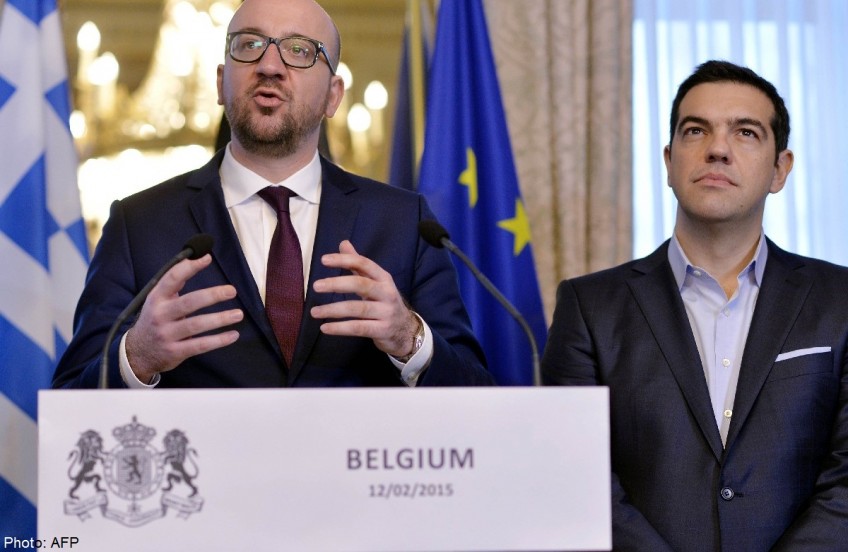Greek PM confronts European leaders over bailout

BRUSSELS - Greek Prime Minister Alexis Tsipras confronts European leaders including German Chancellor Angela Merkel at his first EU summit Thursday, after his government failed to secure a deal on renegotiating its huge bailout.
Tsipras warned ahead of the Brussels summit that the EU was now at a "turning point" following the breakdown of talks on the Greek debt crisis between eurozone finance ministers Wednesday night.
The start of the summit was delayed until 1400 GMT after Merkel and French President Francois Hollande stayed through the night in the Belarussian capital to seal a ceasefire deal aimed at ending the Ukraine conflict.
Tsipras will try to persuade the other 27 European Union leaders to back an austerity-lite replacement plan for Greece's 240-billion-euro ($270-billion) EU-IMF bailout, which expires at the end of February.
"We are at a crucial turning point for Europe," Tsipras said after meeting Belgian premier Charles Michel. "We have to prove that Europe can find a solution, respect the positions that the parties take, and combine respect for democracy with European rules." Economic powerhouse Germany is the stiffest opponent of the plans unveiled by the new government in Athens, formed by Tsipras after his hard-left Syriza party won an election in January on the back of huge popular discontent with years of austerity.
'Heavy for Tsipras'
Merkel, Europe's most powerful leader, and Tsipras will sit around the same table for the first time as part of the summit of 28 European Union leaders, but there was no immediate prospect of a face-to-face encounter.
"There is no meeting fixed yet with Merkel, but we always respond to invitations that are addressed to us," a Greek government source told AFP.
Another European source said the atmosphere at the summit would be "heavy, very heavy for Tsipras." Greek Finance Minister Yaris Varoufakis failed to seal an agreement in tense talks with his counterparts in the Eurogroup of eurozone finance ministers on Wednesday night, with a make-or-break meeting set for on Monday.
Failure to reach a deal on an extension of the bailout or a credit line for Greece by the end of February means Athens would default and almost inevitably crash out of the eurozone.
The euro dipped in Asian trade Thursday after the Eurogroup talks broke up without agreement but Greek stocks were up 4.01 per cent, after closing down over 4.0 per cent on Wednesday.
With Greece weary of the painful austerity imposed with a series of bailouts since 2010, more than 15,000 people turned out on Athens streets in a display of support for the government's programme during Wednesday's talks.
Eurogroup head Jeroen Dijsselbloem, the Dutch finance minister, told a press conference after the meeting that "not enough progress" was made despite "constructive" talks.
Greek sources strongly denied reports that there had been agreement on a joint statement with the other ministers, but that it was torpedoed by Tsipras after his finance minister called him to confirm.
They raised the possibility that Varoufakis could remain in Brussels this weekend ahead of the Monday meeting, adding that they were "very optimistic that soon we will reach a good mutual solution."
Greek plan
The Greek 10-point proposal would see Athens stick to 70 per cent of its bailout reform commitments but overhaul the remaining 30 per cent. Greece also wants a debt swap that will free up funds for economic growth.
Crucially, the government wants a bridging loan until September to buy time to hammer out the new programme.
At the same time it insists on raising the minimum wage and ditching an unpopular property tax, reversing key reforms demanded of previous Greek governments by the EU and IMF.
It also wants to ditch inspections by the hated troika of creditors - the European Commission, IMF and European Central Bank.
The bailout negotiations are the latest stage in a long-running crisis over Greece's huge debts, run up during years of overspending including the 2004 Athens Olympics.
If the EU is unwilling to help, Greece has suggested that it could look to Russia or China for help, further raising the stakes for European unity as it wrestles with economic stagnation and the crisis in Ukraine.